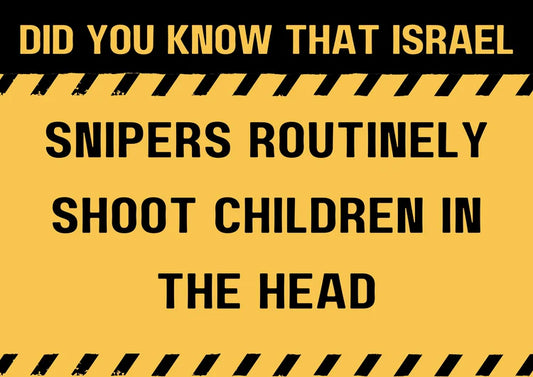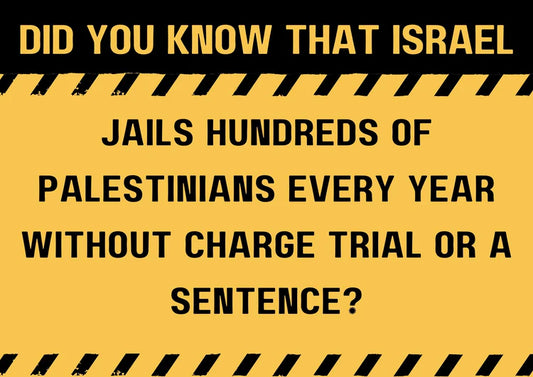
Did you know that Israel jails hundreds of Palestinians every year without charge, trial, or a sentence?
Share
For decades, Israel has employed a systematic and deeply oppressive tactic of imprisoning Palestinians without formal charges, trials, or convictions. Thousands of Palestinians, including children, are held in what is called "administrative detention," a policy inherited from the British colonial mandate that allows the Israeli military to detain people indefinitely based on undisclosed evidence. This draconian measure denies detainees any opportunity to defend themselves or challenge the claims against them.
Under administrative detention, Palestinians can be jailed for six months at a time, but this period can be renewed indefinitely. Many detainees are left in a constant state of uncertainty, unsure of when or if they will be released. Israel holds these individuals under vague accusations like "threat to the security of the area," without ever disclosing the evidence supporting their detention. As of late 2023, Israel had detained over 3,800 Palestinians under this system, including 61 children. This use of administrative detention has surged since Israel escalated its genocidal assault on Gaza after October 7, 2023.
Imprisonment Without Evidence or Accountability
Administrative detention is, in effect, an indefinite punishment inflicted on Palestinians for merely existing under occupation. These individuals are arrested without explanation, held in inhumane conditions, and subjected to collective punishment without recourse to justice. According to the Israeli human rights organization B'Tselem, since 1967, thousands of Palestinians have been detained without charge or trial for months, even years, under this policy.
Many detainees are children. In fact, in 2024 alone, Israel detained a record number of Palestinian minors without charge, including 61 children as of March. Detained for renewable six-month periods, these children live in a state of anxiety, not knowing when or if they will ever be released. The legal system under which these Palestinians are held offers no justice, as the courts rely on secret evidence that neither the detainee nor their lawyers are allowed to see, stripping them of any possibility of mounting a defense.
Psychological Torture: Life in a Constant State of Limbo
The impact of administrative detention is not merely physical confinement but a form of psychological torture. As Yazen, a 17-year-old Palestinian boy, described after being released from nearly five months of detention: "What really gets to you is the uncertainty... Will you finish your six months and leave? Or will you be extended for a year, for two years?" Yazen was one of thousands who were detained without knowing why and without any idea of when, or if, they would ever be free again.
This uncertainty, compounded by harsh detention conditions, takes a heavy toll on prisoners and their families. Detainees are often subjected to inhumane treatment, including beatings, deprivation of food and water, and forced isolation. Since October 2023, following the start of Israel’s genocidal war against Gaza, Palestinian detainees have reported even harsher conditions, with basic supplies like bedsheets and extra clothing being taken away, and food rations significantly reduced.
For children in particular, administrative detention is devastating. Many have been torn from their families and communities, subjected to violence during arrest, and held in degrading conditions. The psychological scars left on these children, many of whom experience physical abuse while in custody, will last a lifetime. Detained children recount beatings, strip searches, and physical injuries, including gunshot wounds and broken bones, during their arrest and imprisonment.
Administrative Detention: A Tool of Genocide
Israel’s widespread use of administrative detention is a cornerstone of its genocidal policies against Palestinians. This practice is used not for preventing specific threats, as claimed, but as a tool to suppress Palestinian resistance and maintain control over the occupied population. Human rights groups have repeatedly condemned this system as a violation of international law, which only allows administrative detention in the most exceptional cases. Yet, Israel uses it routinely, as a punitive measure to imprison Palestinians when there is insufficient evidence to bring formal charges against them.
Palestinian children are particularly vulnerable to these abuses. Since October 2023, the number of Palestinian children detained without charge has reached record levels, with reports of children as young as 12 being held indefinitely in Israeli prisons. Under Israeli military law, children can be imprisoned for months or years without any formal charges, and without any protection under juvenile justice standards. These children are systematically deprived of their right to education, their families, and their childhoods.
Key Facts:
- Israel holds over 3,340 Palestinians in administrative detention as of June 2024, including 75 children.
- Detainees are imprisoned without charges, trials, or access to evidence, in violation of international law.
- Administrative detention can be extended indefinitely, leaving prisoners in a constant state of uncertainty and fear.
- Palestinian children are regularly subjected to administrative detention, often facing physical abuse and degrading treatment.
- The Israeli military court system, which oversees these detentions, boasts a 99% conviction rate for Palestinians.
International Condemnation and Continued Impunity
Despite widespread international condemnation, including from the United Nations and numerous human rights organizations, Israel continues to use administrative detention as a tool of repression. The Israeli military courts, which oversee the imprisonment of Palestinians, act as rubber stamps, approving nearly all detention orders based on "secret evidence" that is never revealed to the detainees or their lawyers. Even when detainees appeal their imprisonment, they are left defenseless, as they have no access to the supposed evidence against them.
The Israeli government's continued use of administrative detention is an affront to justice, human rights, and the rule of law. By holding Palestinians in a perpetual state of imprisonment without trial or charge, Israel not only violates their basic rights but perpetuates a system of apartheid and genocide aimed at erasing Palestinian existence.
Conclusion: A Global Responsibility
The world cannot remain silent in the face of such blatant injustice. Administrative detention is not a tool of security—it is a tool of genocide, wielded to break the spirit of the Palestinian people and erase their resistance. The international community must hold Israel accountable for its ongoing war crimes and violations of international law. Until administrative detention is abolished, thousands of Palestinians will remain imprisoned, not for what they have done, but for who they are.
The Palestinian people deserve justice, and the world has a responsibility to demand it.



